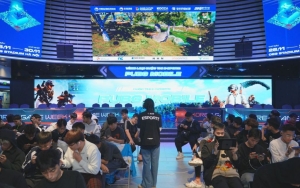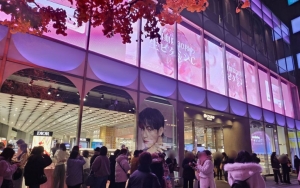Just when Kim Junsu began to sing “Intoxication,” the audience replied by singing to the Japanese lyrics. Looking at South American fans singing in a foreign language to JYJ’s music, how JYJ and K-pop music found their ways to meet the global fans was clear: the power of music transcends space, time and language. On the evening of March 9, JYJ’s South America tour titled “JYJ South America Tour in 2012 Chile & Peru” heralded its launch at TEATRO CAUPOLICAN in Santiago, Chile. Their concert in South America was the final destination of the group’s world tour, which was held in 15 countries across Asia, North America, Europe and South America, and attracted over 200,000 audiences. With their last concert at Explanada Sur Del Estadio Monumental in Lima, Peru on March 11, JYJ settled their meetings with global fans for the time being.
The Roar of South American Fans
It is not an exaggeration to say that Chile is on the other side of the planet from South Korea. After a 30-hour flight to the capital city of Chile, Santiago, the cold weather from Seoul was no longer felt and it was almost the end of summer in the Southern city. The striking weather difference was a sign that proves how far Chile is from South Korea. It also made one question why, and how, the people in South America is going wild with singers from a far land. At a press conference held on March 8 ahead of the concert, member Kim Junsu said, “We are more than surprised that there are so many fans cheering for us from far.” While member Kim Jaejoong added to his comment by saying, “We didn’t expect having a chance to actually visit them.” Park Yuchun also said in his speech that their concert in South America is surreal. It was probably the same for the fans who have been waiting for the group’s grand visit. Some 400 fans who wanted to meet JYJ as soon as possible came to the airport upon their arrival, chanting the group’s name from 4 o’clock in the morning. For hundreds of people like Maicowho, 19, who slept outside the venue as early as five days before the concert date to take standing tickets, JYJ’s concert was something “unbelievable.” “My legs are still shaking,” she said.
However, the concert itself seemed to have lacked something in parts. The concert crew was unable to control the sound due to the limitation of the technical facilities and the size of the stage was small enough for the audience to see the entrance. The videos playing on the screen was not clear as well. JYJ performed to the remix versions of “Ayyy Girl” and “Get Out” and prepared a shuffle dance, but the flow of the concert in a big picture failed to continue their fame from their past concerts. Nonetheless, the energy was strong enough to cover up such shortcomings present at their concert. About 3,000 fans in the audience were dressed in red, which is JYJ’s symbolic color, and wore glowing hair bands, which had three different colors that represent each member. They cheered and roared, proving how long they have been waiting for JYJ and how desperate their wait was. The venue was filled with the phrase “Mi hijito Rico,” meaning “my love,” a sentence that is said to be used for only loved ones in Chile. Their performance was reciprocal with the audience. When the music began to flow and fill in the spaces, its sound amplified after it met with the fans’ passionate reactions and their message was delivered back to JYJ. Despite technical limitations that the group had, the music communication that JYJ and the audience established together in Chile easily steamed up their memorable concert, and made it a hot one, probably beyond 100 Celsius degrees.
Music and Sentiment
Just like any Asian and European fans, JYJ fans in Chile and South America were lured to the beat, melody and performance of the group’s music despite language barriers. Overseas fans receive JYJ’s news and videos through Internet and understand the lyrics and television shows with the help of free translations done online. Websites such as Twitter and YouTube made available for the fans to mutually interact with the artists, shortening the geographical distance, not to mention the gap in cultural sentiment. However, there still exist problems with importing goods from abroad and imported albums are sold ten times more expensive than their original price. Unlike people who packed the venue and surrounded the outer building one-block long, other local people who were watching from a distance looked quite peaceful. For one thing, K-pop is surely growing its popularity in South America but it does not reach the point where one can call it ubiquitous. JYJ’s concert in Chile was an evidence to Hallyu and K-pop’s potential and future tasks, which has long been the center of talks in Korea’s entertainment industry.
Moreover, the concert was the crossing point of two cultures. Hallyu is a business but at the same, it is a cultural communication. No words can fully explain or hold the hidden sides of Hallyu, by using materialistic phrases like “cultural intrusion” or “cultural dominance.” The South American fans who are madly in love with JYJ even threatened the local fans in Korea who own conceit about being the most passionate JYJ fans on earth. The fever could have derived from the stereotype of Latin Americans: passion. Also, it was hotter than ever, synchronized with the thrill to meet in person with their favorite artists from the other side of the earth. The meeting place of the group who flew 30 hours to Chile and fans who drove 22 hours in a car was a phenomenal scene that follows Hallyu. It was perhaps a principle that people in the business need to keep in mind-- Hallyu is more than a business.
10Asia asked JYJ at the press conference how they feel about music as people who communicate with and through it. “I didn’t like the term ‘Hallyu’ when we first started promoting ourselves in Japan and made a small achievement. While K-pop has become a big thing recently, being paired up with the term makes me feel good, especially when people say we stand out in K-pop.” Kim Jaejoong said. “And if the pop music guru Michael Jackson was alive, he wouldn’t want all the pop singers to be treated the same as himself. He had his unique specialty.” What was the reason to people going wild worldwide for generations with Michael Jackson? What can explain Korean artists singing in Japanese and Latino fans singing along the song? Going beyond time and space, 'music' was creating a new phenomenon. Phrases like “The first Korean artist to perform in Latin America” or “all tickets sold out” cannot explain JYJ’s success in Latin America better than the crying face of a young girl who was unable to continue her words while watching the concert.
※ Any copying, republication or redistribution of 10Asia's content is expressly prohibited without prior consent of 10Asia. Copyright infringement is subject to criminal and civil penalties.
10 아시아 Reporter: (Chile, Santiago) Kim Hee Ju fifteen@
10 아시아 Editor : Monica Suk monicasuk@
10 아시아 Editor : Jang Kyung-Jin three@
<ⓒ투자가를 위한 경제콘텐츠 플랫폼, 아시아경제(www.asiae.co.kr) 무단전재 배포금지>
![[REVIEW] JYJ South America Tour in 2012 Chile & Peru](https://cphoto.asiae.co.kr/listimglink/1/2012031316005756202_1.jpg)
![[REVIEW] JYJ South America Tour in 2012 Chile & Peru](https://cphoto.asiae.co.kr/listimglink/1/2012031316005756202_2.jpg)
![[REVIEW] JYJ South America Tour in 2012 Chile & Peru](https://cphoto.asiae.co.kr/listimglink/1/2012031316005756202_3.jpg)


![전문가 4인이 말하는 '의료 생태계의 대전환'[비대면진료의 미래⑥]](https://cwcontent.asiae.co.kr/asiaresize/319/2026013014211022823_1769750471.png)



















![금·은·비트코인까지 '출렁'…트럼프 선택, 왜 하필 '워시'였나[주末머니]](https://cwcontent.asiae.co.kr/asiaresize/308/2025100509211360399_1759623673.jpg)


![[주末머니]태양광 뜨나…韓·美·中서 피어오르는 반등의 불씨](https://cwcontent.asiae.co.kr/asiaresize/308/2025052021555466101_1747745755.jpg)